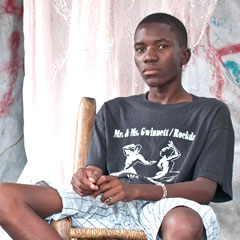
Children, lost and disoriented, looking for a safe place after the earthquake found it in the courtyard of the Holy Cross Sisters. For more than a week the children were crowded in, occupying the driveway and the garden and reluctant to spend much time under the Sisters’ rather sturdy roof.
Of course they were troubled and traumatized, said Sr. Marie-Pierre Saint Amour. She didn’t need her training in psychology from the University of Ottawa to tell her that. She heard the children’s cries at night when nightmares woke them. She saw the angry face of the devil in their drawings.
Since then, Saint Amour has come to realize her whole country is suffering from a sort of mass post-traumatic stress disorder. She’s had some success treating the young people, but how do you administer psychotherapy to a nation?
“Everyone is focussed so much on the medical, but forgetting the psychological,” said Fr. Michel Martin Eugene, a Holy Cross priest and psychologist.
There are fewer than six psychiatrists in all of Haiti, Dr. Peter Kelly said. Kelly is president of the Crudem Foundation, which runs Sacre Coeur Hospital in Milot with the support of three American groups of the Order of Malta and Catholic Relief Services.
Kelly and other volunteer doctors in Haiti after the earthquake observed widespread post-traumatic stress syndrome. They also saw that most Haitian medical staff were reluctant to diagnose depression or PTSD.
“I believe it has something to do with their culture, as well as the fact that they have faced so many hardships throughout their history that they accept it as normal and move on with their lives,” Kelly wrote in an e-mail.
Unlike the doctors, Haiti’s religious see psychotherapy as an essential, missing piece of the recovery. Working with students in education and social work, the Psychosocial Support Network of the Haitian Religious Conference has created a program to help people face trauma that has often been ignored for months while they dug out their neighbours, tracked down lost family members, went back to work and managed life in a tent. In many cases, depression, anxiety and all-pervading fear hit people months after the earthquake, said Saint Amour.
“They never dealt with the trauma, then they are hit with a lack of energy, depression.”
“It’s a big crisis,” said Eugene. “They wander the street — broken people.”
Eugene’s assessment of the situation is rare among Haitians, who “are so stoic,” said Kelly.
“It is also difficult to institute training of Haitian medical personnel to treat this problem when they tend to deny its existence,” he said.
The Haitian religious network’s psychosocial program, aided by $83,000 from the Canadian Catholic Organization for Development and Peace, concentrates on Haitians supporting each other — talking through problems with each other in their native Creole.
University student Marguerite Charles credits the Sisters and the psychosocial program for helping her. On Jan. 12 she spent between four and five hours trapped in rubble. When she got out her home was gone.
“There was shock, trauma. I didn’t feel at ease any more.”
Like many Haitians, Charles was afraid to remain indoors for any length of time. The education student now leads a group of teenagers who gather to discuss their experience and their fears. She is passing on the experience of psychological healing she received from the Sisters.
She credits Sr. Matilde Moreno with restoring her confidence so she could go back to university. Moreno led the young people in dances and encouraged them to draw and paint, and then got them talking about their fears.
Edna Genvieve lives in a tent beside her former home with her daughter. At one point she thought she and her daughter would always live in fear.
“After the earthquake, I thought life was over,” she said. “When it rains, I’m still very afraid.”
She was even more afraid for her daughter, who over and over drew pictures of the devil.
“It’s what she was living,” said Genvieve.
Only after her daughter overcame her dread did Genvieve begin to think about the future.
“Slowly, slowly I saw that life was still possible through my daughter — that there still is a future,” she said.

